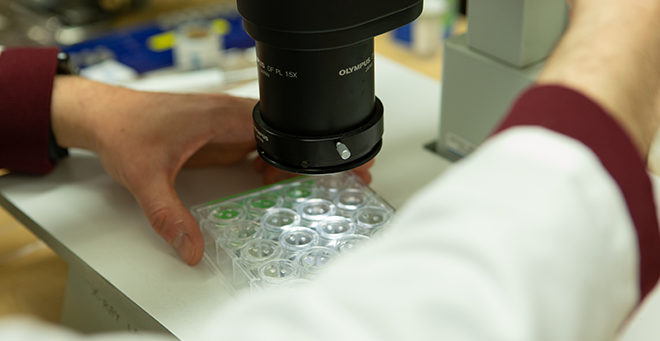
A new research fellowship program is launching at UMass Chan Medical School this year to recruit exceptionally talented junior scientists who have the potential to become independent investigators.
The UMass Chan Early Independence Fellows program will provide three researchers from diverse backgrounds who received their doctoral degrees within the previous 24 months with career development, mentoring and financial support to foster their scientific excellence and leadership.
The initiative was inspired by the T.H. Chan family’s vision to have a transformational impact on the Medical School with its $175 million gift from The Morningside Foundation in 2021, according to Terence R. Flotte, MD, the Celia and Isaac Haidak Professor, executive deputy chancellor, provost and dean of the T.H. Chan School of Medicine.
“Working with a select group of our faculty, deans and other leaders, a plan was developed to attract the very best scientific talent in the world by supporting their research during the early stages of their transition to becoming independent scientists,” said Dean Flotte. “These brilliant young scientists will be recruited from a wide range of backgrounds including those that are underrepresented in medicine and in the biomedical sciences.”
Fellows will join one of two tracks. The Maraganore Fellows track, funded by donations from RNAi pharmaceutical entrepreneur John Maraganore, PhD, and his wife, Christine Maraganore, as well as from RNA Therapeutics Institute faculty, will support one fellow who will develop an independent research program in RNA biology or RNA therapeutics. The Chan Early Independence Fellows track, funded by The Morningside Foundation’s gift, will support two fellows who develop independent research programs that align with any area of excellence at UMass Chan.
Fellows will be appointed non-tenure track assistant professors but will have the possibility of transitioning to tenure track based on their productivity and success. The program will provide each fellow financial support of approximately $440,000 per year for three to five years, to cover salary, research support and travel. A child care supplement of up to $10,000 will be provided to fellows with dependent children.
At a glance |
|---|
|
A key part of the program is the support fellows will receive from a team of faculty mentors as well as their participation in the Investigator Career Advancement Program (iCAP) to accelerate their growth as independent investigators and team leaders.
The Office of Health Equity will provide administrative leadership for the program.
“There are very few institutions in the country that offer this type of programs with this level of opportunities and resources, and we believe that we have the talent here to bring these brilliant scientists here and foster their future success as independent investigators,” said Milagros C. Rosal, PhD, the Imoigele P. Aisku, MD’79 Chair in Health Equity and Diversity, professor of population & quantitative health sciences and vice provost for health equity.
“The resources are up there with the best programs in the country, and we have a stellar resource in iCAP, which is unique and part of other efforts to provide inclusive and equitable opportunities for career development of junior scientists,” she said.
“These brilliant young scientists will be recruited from a wide range of backgrounds including those that are underrepresented in medicine and in the biomedical sciences.”
Dr. Rosal emphasized that the leadership team wants to identify a diverse pool of candidates. One way they will lessen biases that may arise from a candidate’s name or the institution where they studied will be the requirement to submit an anonymized research plan. Candidates will also be asked to submit a personal statement describing how their lived experiences have informed their values, priorities and career goals.
“This program is an alternative to traditional postdoc positions as successful applicants will receive very generous resources to work as principal investigators and pursue their own research endeavors free from other distractions,” said Katherine Fitzgerald, PhD, the Worcester Foundation for Biomedical Research Chair, professor of medicine, associate vice provost for basic science research and vice chair for research in the Department of Medicine. Dr. Fitzgerald serves as co-chair of the search committee for the Chan Early Independence Fellows track.
Brian Lewis, PhD, the George F. Booth Chair in the Basic Sciences, professor of molecular, cell & cancer biology and assistant vice provost for outreach and recruitment for UMass Chan, co-chairs the search committee with Fitzgerald.
“It’s a way to attract the most creative talent, right?” said Dr. Lewis.
Lewis said that the career and professional development aspects of the program, and the emphasis on the mentoring team, are unique features. He said, “Most of us don’t have long-term mentoring experience when we go through graduate school and our postdoc. And yet, when you have your lab, it is an absolutely critical part of what you need to do.”
Phillip D. Zamore, PhD, Howard Hughes Medical Institute Investigator, the Gretchen Stone Cook Chair in Biomedical Sciences, and chair and professor of RNA therapeutics, leads the Maraganore Fellows track for research related to RNA biology or therapeutics.
“There are many, many more smart, talented people who are not going into academia than who do,” Dr. Zamore said. “And in addition to those we would normally capture in a faculty search, we want to find people who are right out of graduate school, have no experience running a lab, but are just brimming with ideas and who can in some way add diversity, differences in life experience to our faculty who have come through the traditional faculty search.”
Zamore said that diversity includes not only personal background but also where applicants got their PhDs. “We want to identify people who will be tremendously successful and whose research will have a big impact when they’re here, irrespective of whether or not they had the opportunity previously to work at a truly world class research institution.”
For further information contact Natasja Hirabayashi at Natasja.hirabayashi@umassmed.edu for the Chan Early Independence Fellows track or Angela Messmer Blust at angela.messmerblust@umassmed.edu for the Maraganore track.
